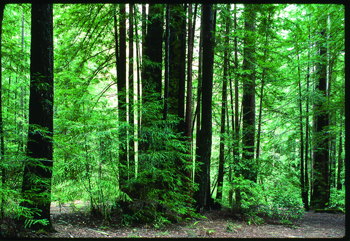UC Santa Cruz is piling up so many high-profile sustainability rankings and honors that it’s easy to lose track of them all.
But UCSC’s latest recognition, in the Princeton Review’s newly published “green colleges” guidebook, is more than just another honor. It’s also a history of successful green-energy projects on campus.
The Princeton Review has given the campus a prominent, detailed and highly complimentary entry in The Princeton Review's Guide to 311 Green Colleges: 2011 Edition, which profiles 308 eco-friendly colleges and universities in the United States and three in Canada.
Released on Earth Day, the publication includes a 273-word descriptive paragraph about UCSC’s work to minimize environmental impact and increase efficiency, and the green-energy recognition it has received over the past few years.
For starters, the article mentions “the campus boasts a 70 percent waste-diversion rate and gets 10 percent of its energy from renewable sources.” Then the Green Colleges guide praises UCSC for slashing greenhouse gas emissions, “greening its design … and integrating sustainability at every institutional level.”
The Princeton Review is best known for standardized test preparation services and college admissions consulting, but it’s also known for its highly publicized rankings of colleges across the United States.
The publication walks the reader through a long list of previous recognitions. Among those honors is UCSC’s inclusion on the Sierra Club’s top 20 list of the “Coolest (greenest) Schools” in 2009 and 2010, and the Environmental Protection Agency naming UCSC on its list of the nation’s largest campus purchasers of “green” energy for the last several consecutive years. UCSC remains on the EPA’s top 10 list.
The book also mentions that the Chuck Haugen Conservation Fund, dedicated to preserving ecosystems in and around the Monterey Bay National Marine Sanctuary, named the UCSC Arboretum nonprofit of the year in 2008.
The publication singles out the campus Sustainability Office for special praise, mentioning its project idea database, which includes suggestions by students, faculty, and staff to improve sustainable practices on campus, while encouraging students to apply for $10,000 grants via the College FilterForGood Eco-Challenge.
The article also includes a long list of influential student-staffed organizations on campus: the Student Environmental Center, Friends of the Community Agroecology Network, the Campus Sustainability Council, the California Public Interest Research Group, the Green Campus Program, California Student Sustainability Coalition, Education for Sustainable Living Program, Environmental Media Project, and the Program in Community and Agroecology.
In closing, the Princeton Review praises UCSC faculty and students for winning awards for sustainability-focused projects and research.
According to the Princeton Review, all of the included universities and colleges “demonstrate notable commitments to sustainability in their academic offerings, campus infrastructure, activities and career preparation.”
The 220-page book can be downloaded free of charge at www.princetonreview.com/green-guide.aspx and www.centerforgreenschools.org/greenguide



